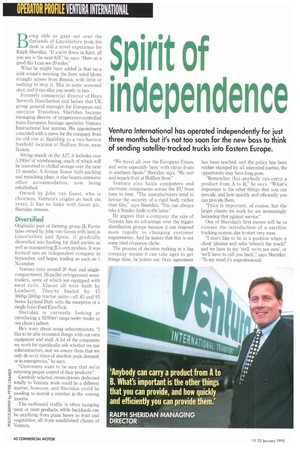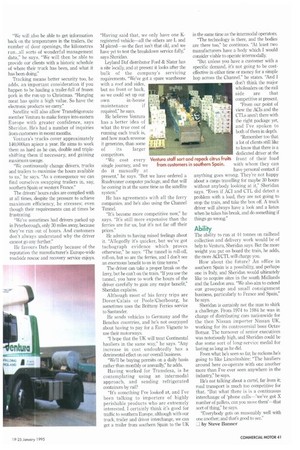Spirit of independence
Page 42

Page 43

If you've noticed an error in this article please click here to report it so we can fix it.
Ventura International has operated independently for just three months but it's not too soon for the new boss to think of sending satellite-tracked trucks into Eastern Europe.
Being able to gaze out over the flatlands of Lincolnshire from his desk is still a novel experience for Ralph Sheridan. "If you're down in Kent, all you see is the next hill," he says. "Here on a good day I can see 20 miles."
What he might have added is that on a cold winter's morning the keen wind blows straight across from Russia, with little or nothing to stop it. Mix in some seasonal sleet, and it can slice you neatly in two.
Formerly commercial director of Hays Network Distribution and before that UK group general manager for European rail operator Transfesa, Sheridan became managing director of temperature-controlled trans-European haulage specialist Ventura International last autumn. His appointment coincided with a move for the company from its old site at Spalding to a two-hectare freehold location at Hoffleet Stow, near Roston.
Sitting smack on the A17, it includes over 5,100m2 of warehousing, much of which will be converted to chilled storage over the next 12 months. A former flower bulb packing and repacking plant, it also boasts extensive office accommodation, now being refurbished.
Owned by John van Geest, who is chairman, Ventura's origins go back six years. It has no links with Geest plc, Sheridan stresses.
Diversified
Originally part of farming group JL Farms (also owned by John van Geest) with land in Lincolnshire and Spain, it gradually diversified into hauling for third parties as well as transporting JL's own produce. It was formed into an independent company in September, and began trading as such on I November.
Ventura runs around 20 dual and singlecompartment 26-pallet refrigerated semitrailers, some of which are equipped with meat rails. Almost all were built by Lamberet. They're hauled by 15 360hp/380hp tractor units—all 85 and 95 Series Leyland Dafs with the exception of a single Iveco Ford EuroTech.
Sheridan is currently looking at introducing a 92/95m3 mega-reefer trailer at one client's behest.
He's wary about using subcontractors. "I like to be able to control things with our own equipment and staff. A lot of the companies we work for specifically ask whether we use subcontractors, and we assure them that we only do so at times of absolute peak demand, or in emergencies," he says.
"Customers want to be sure that we're retaining proper control of their products."
Carefully selected owner-drivers dedicated totally to Ventura work could be a different matter, however, and Sheridan could be needing to recruit a number in the coming months.
The outbound traffic is often hanging meat or meat products, while backloads can be anything from pizza bases to fruit and vegetables; all from established clients of Ventura. We travel all over the European Union, and we're especially busy with citrus fruits in southern Spain," Sheridan says. "We sort and repack fruit at Hoffleet Stow" Ventura also hauls computers and electronic components across the EU from time to time. "The manufacturers tend to favour the security of a rigid body rather than tilts," says Sheridan. "You can always take a Stanley knife to the latter."
He argues that a company the size of Ventura has an advantage over the bigger distribution groups because it can respond more rapidly to changing customer requirements. And he insists that this is not some tired corporate cliche.
The process of decision making in a big company means it can take ages to get things done, he points out. Once agreement has been reached, and the policy has been rubber stamped by all interested parties, the opportunity may have long gone.
"Remember that anybody can carry a product from A to B," he says. "What's important is the other things that you can provide, and how quickly and efficiently you can provide them.
"Price is important, of course, but the larger clients we work for are increasingly balancing that against service."
One of Sheridan's first moves will be to oversee the introduction of a satellite tracking system, due to start very soon.
"I don't like to be in a position where a client 'phones and asks 'where's the truck?' and we have to say 'well, we're not sure', or 'we'll have to call you back'," says Sheridan. "To my mind it's unprofessional. "We will also be able to get information back on the temperatures in the trailers, the number of door openings, the kilometres run...all sorts of wonderful management data," he says. "We will then be able to provide our clients with a historic schedule of where their truck has been, and what it has been doing."
Tracking means better security too, he adds, an important consideration if you happen to be hauling a trailer-full of frozen pork in the run-up to Christmas. "Hanging meat has quite a high value. So have the electronic products we carry."
Satellite will also allow Transfrigoroute member Ventura to make forays into eastern Europe with greater confidence, says Sheridan. He's had a number of inquiries from customers in recent months.
Ventura's trucks cover approximately 140,000km apiece a year. He aims to work them as hard as he can, double and tripleshifting them if necessary, and gaining maximum useage.
"We continuously change drivers, trucks and trailers to maximise the hours available to us," he says. "As a consequence we can find ourselves swapping trailers in, say, southern Spain or western France."
The drivers' hours rules are complied with at all times, despite the pressure to achieve maximum efficiency, he stresses; even though their requirements can at times be frustrating.
"We've sometimes had drivers parked up in Peterborough, only 30 miles away, because they've run out of hours. And customers don't always understand why the driver cannot go any further."
He favours Dafs partly because of the reputation the manufacturer's Europe-wide roadside rescue and recovery service enjoys. "Having said that, we only have one Kregistered vehicle—all the others are L and M plated—so the fleet isn't that old, and we have yet to test the breakdown service fully," says Sheridan.
Leyland Daf distributor Ford & Slater has a site locally, and at present it looks after the bulk of the company's servicing requirements. "We've got a spare warehouse with a roof and sides, but no front or back, so we could set up our own in-house maintenance if required," he says.
He believes Ventura has a better idea of what the true cost of running each truck is, and how much revenue it generates, than some of i ts larger competitors.
"We cost every single journey, and we do it manually at present," he says. "But we have ordered a Roadrunner computer package, and that will be coming in at the same time as the satellite system."
He has agreements with all the ferry companies, and he's also using the Channel Tunnel.
"It's become more competitive now," he says. "It's still more expensive than the ferries are for us, but it's not far off their prices."
He admits to having mixed feelings about it. "Allegedly it's quicker, but we've got tachograph evidence which proves otherwise," he says. "The tunnel is roll-off, roll-on, but so are the ferries, and I don't see an enormous benefit to us in time terms."
The driver can take a proper break on the ferry, but he can't on the train. "If you use the tunnel, you have to work the hours of the driver carefully to gain any major benefit," Sheridan explains.
Although most of his ferry trips are Dover/Calais or Poole/Cherbourg, he sometimes uses the Brittany Ferries service to Santander.
He sends vehicles to Germany and the Benelux countries, and he's not overjoyed about having to pay for a Euro Vignette to use their motorways.
"I hope that the UK will treat Continental hauliers in the same way," he says. "Any increase in cost undoubtedly has a detrimental effect on our overall business.
"We'll be buying permits on a daily basis rather than monthly or annually," he adds.
Having worked for Transfesa, is he contemplating using an intertnodal approach, and sending refrigerated containers by rail?
"It's something I've looked at, and I've been talking to importers of highly perishable products who are extremely interested. I certainly think it's good for traffic to southern Europe, although with our truck, trailer and driver interchange, we can get a trailer from southern Spain to the UK in the same time as the interrnodal operators.
"The technology is there, and the bodies are there too," he continues. "At least two manufacturers have a body which I would consider viable to operate intermodally.
"But unless you have a customer with a specific demand, it's not going to be costeffective in either time or money for a simple hop across the Channel." he states. "And I don't think the major wholesalers on the rail side are that competitive at present.
"From our point of view the ACIs and the CIL; aren't there with the right package yet, and I've spoken to both of them in depth.
"Remember too that a lot of clients still like to know that there is a dedicated driver at the Ventura staff sort and repack citrus fruits front of their load from customers in southern Spain. with whom they can have personal contact if anything goes wrong. They're not happy about a cargo travelling for maybe 30 hours without anybody looking at it," Sheridan says. "Even if ACI and cri., did detect a problem with a load, they are not going to stop the train, and take the box off. A truck driver will always have a look and a listen when he takes his break, and do something if things go wrong."
Ability
The ability to run at 44 tonnes on railhead collection and delivery work would be of help to Ventura, Sheridan says. But the more weight you put on board the train, he adds, the more ACl/CTL will charge you.
How about the future? An office in southern Spain is a possibility, and perhaps one in Italy, and Sheridan would ultimately like to acquire sites in the south Midlands and the London area. "We also aim to extend our groupage and small consignment business, particularly to France and Spain," he says.
Sheridan is certainly not the man to shirk a challenge. From 1974 to 1984 he was in charge of distributing cars nationwide for the then Nissan importer Nissan UK, working for its controversial boss Octav Botnar. The turnover of senior executives was notoriously high, and Sheridan could be due some sort of long-service medal for lasting as long as he did.
From what he's seen so far, he reckons he's going to like Lincolnshire: "The hauliers around here co-operate with one another more than I've ever seen anywhere in the industry," he says.
He's not talking about a cartel, far from it; road transport is much too competitive for that. "But what there is is a continuous interchange of 'phone calls—'we've got X number of pallets, can you move them'—that sort of thing," he says.
"Everybody gets on reasonably well with one another; and that's good to see."
by Steve Banner




























































































